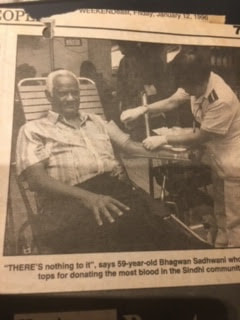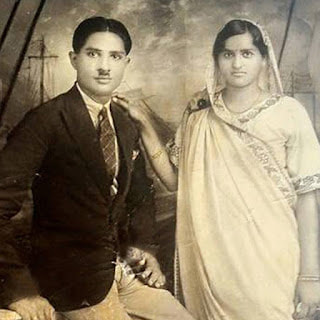From Hyderabad to Singapore Bhagwan being recognised in a local newspaper for donating blood in Singapore on countless occasions. Bhagwan being recognised in a local newspaper for donating blood in Singapore on countless occasions. Bhagwan Sadhwani was born in 1936 in Hyderabad, Sindh, British India, the second son in a family of four boys and one girl. Following the partition of British India, Bhagwan’s family moved to the island of Penang in Malaysia, after a brief transition in Jodhpur and Bombay, India. Despite having to leave his home and start over in a new place and country, Bhagwan’s positive and optimistic nature has never ceased – this comes through clearly even when he talks about having to leave home and move to different countries – what he recounts are happy moments playing with the neighbouring children, taking walks on the beach close to their temporary home, and expresses his gratitude for the opportunities that his adopted home has provided. Bhagwan currently resides in Singapore, and this is his story. Life was very pleasant in Hyderabad, Sindh, recalls Bhagwan. He lived in a joint household - three families under one roof - which was very common in those days. "We'd visit and host relatives with abundant food and fruits. The weather was pleasant. It was a beautiful town with gardens, schools, colleges and excellent road systems," Bhagwan reminisces. "We used to celebrate a lot of festivals, many of which are not observed now, especially overseas."  Bhagwan's parents (Sindh, 1938) Bhagwan's parents (Sindh, 1938) These pleasant memories are also interlaced with mischief. Bhagwan recounts one particular occasion with great clarity. “Our next door neighbour’s eldest son would pay my older brother, Lal, to run some errands for him. One day, Lal was given one rupee to buy some omelette kebabs, and was given half rupee in change. The neighbor told Lal to keep it as a gift,” Bhagwan says. “We were ecstatic! With that money, Lal and I secretly went to see a Hindi movie in the cinema. I still remember the name of the movie – it was called Ratan. We were feeling very pleased with ourselves because at that time, we weren’t allowed to go to the movies unaccompanied by parents or elders.” Bhagwan pauses for the punchline. “Little did we know that a few days later, our dad would be taking us to see this same movie!” About a month after the partition, in August 1947, Bhagwan and his brothers came back from school around 1pm to find their mother and other relatives, to their surprise, packing suitcases. Around an hour later, they left for the railway station, where they were subjected to a search of their luggage. Valuables like jewelry were taken away, and only then were thy allowed to board the train, which was destined for the nearest border town of Jodhpur. At the railway station, Bhagwan remembers many people crying - both out of sadness about having to leave their home, as well as fear and confusion about going to a destination that most were not familiar with and thoughts about how they were going to earn a living again and support their family.
It was approximately 10pm when Bhagwan and his family arrived at the border town, and were escorted to a huge refugee camp, with about 40 people per tent. Around mid-August, the family moved to a haveli (a sort of multi-storey home that centres around a courtyard), which they shared with a few other families. It only had one public tap nearby and two toilets. Bhagwan and his older brother, Lal, used to wake up around 6:30am every day to make the ten-minute trek to the public tap. Each time, there would be around 10 people queuing for water, so the wait would take approximately 20 minutes – then another ten-minute trek back to the haveli. This process was repeated a few times in the morning until they had sufficient water for the day. On most days after breakfast, Bhagwan and his brothers would play and climb trees with the neighbouring kids. He remembers having a lot of fun doing this. In mid-January 1948, the family left for Bombay on another train. Upon arrival in Bombay, the family tried purchasing tickets to Madras for the same day – but they were all sold out. Thousands of other refugees were waiting to board this same train. As a result, the family had to sleep on the train platform for three nights, before they could get seats on the train. After a day’s journey, the family reached Madras – a relative put them up for around ten days. Bhagwan remembers the relative’s house being close to a beach – he and his brothers used to walk along the beach nearly every day. Around the third week of January, the family again packed up, with luggage and all transported by a bullock card to the port, where they were to board a cargo boat called Vaasna headed for the island of Penang (that was to be a part of Malaysia in 1957). For six nights, Bhagwan and his family travelled on the boat, together with at least 50 other families. The journey was rough because of choppy seas and he recounts many passengers becoming seasick over the side of the boat. It was during this journey as well that they received news about Mahatma Gandhi being assassinated. In those days, it was mandatory for all passengers arriving in a new country to be quarantined for three days on an island. However, Bhagwan’s father was able to secure an exemption for his family’s quarantine and, after a four-hour wait, the family was ferried to the mainland. Thankfully, from his business trips, his father had already established a textile store in Penang, Green Silk Shop, in 1947. With this stability and income, the rest of the family were able to come to Penang in 1948. Bhagwan and his brothers started school in Penang the very next day – it was called Hutchings School. It was just after the Japanese occupation and entry into schools were difficult. Bhagwan’s father had to apply for and secure their place months before they even arrived in Penang. Bhagwan has fond memories of Penang – they were one of the first few Sindhi families there. The Capitol Theatre, around 1955, started showing Hindi movies, and the first Sunday matinee Hindi movie, saw tickets being distributed for free to all Sindhis living in Penang at that time (the theatre was owned by a Sindhi businessman)! Although Bhagwan feels sad that he and his family had to leave Sindh, he strongly believes that everything happens for a reason, and that many of the people who left Sindh wouldn’t have had the opportunities or lives that they have today had they stayed on in Sindh. Just like his father, who used to provide voluntary services to those affected by partition such as help with immigration challenges, Bhagwan himself has been recognised on various occasions for his contribution to communities he lives in.
1 Comment
Anonymous
12/31/2021 06:21:14 am
Awesomely love the story about my dear uncle bhagwan...truly a man of solid words...loved it
Reply
Your comment will be posted after it is approved.
Leave a Reply. |
AuthorKeen interest in Partition stories originating from the Province of Sindh. Archives
January 2022
Categories |
 RSS Feed
RSS Feed
